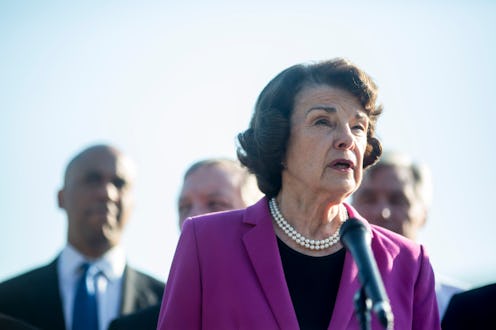News
Trump's SCOTUS Pick Just Answered His First Questions About Abortion Rights At His Hearing

Given the conversation surrounding Supreme Court nominee Brett Kavanaugh from the very moment that President Donald Trump picked him to potentially replace retired Justice Anthony Kennedy, you probably expected that his confirmation hearings would feature at least one — if not many — discussions about women's reproductive rights. On Wednesday, then, Sen. Dianne Feinstein grilled Kavanaugh on his position on abortion rights — and she did not seem satisfied by Kavanaugh's answers.
After using the first part of her allotted time to discuss gun violence, Feinstein moved on to ask Kavanaugh about his opinion on Roe v. Wade. She began by asking whether he agreed with former Justice Sandra Day O'Connor, in that reproductive rights are a decisive factor in whether or not a woman is able to "participate in the economic and social life of the nation."
"As a general proposition, I understand the importance of the precedent set forth in Roe v. Wade," Kavanaugh said, before explaining what Roe guarantees for women in America — namely, the right to have an abortion — and that the economic argument was one of the rationales for the decision in Roe. Kavanaugh did not, however give his own opinion on the subject — which would become a theme during Feinstein's line of questioning.
Feinstein then tried another tactic, bringing up the numbers of women who died after receiving illegal abortions. She misstated a statistic from the Guttmacher Institute, saying that 200,000 to 1.2 million women died in the 1950s and '60s from that cause, when that statistic actually refers to the number of illegal abortions that women across the country obtained every year. According to the Guttmacher Institute, the number of women dying per year from botched illegal abortions was about 100 to 2,700, with the numbers gradually decreasing over the years.
"You have said that Roe is now settled law," Feinstein said. "What do you mean by settled law?"
"One of the important things to keep in mind about Roe v. Wade is that it has been reaffirmed many times over the past 45 years," Kavanaugh answered, citing Planned Parenthood v. Casey as an important case that reaffirmed it.
When Kavanaugh continued to talk about Roe as a settled matter of precedent, Feinstein interrupted him to ask directly about whether he would, in fact, keep his promise to honor stare decisis, or the doctrine of precedent, as explained by Cornell Law School.
"When the subject comes up, the person says, 'I will follow stare decisis,' and they get confirmed, and of course they don't," Feinstein said. "How you make a judgement on these issues is really important ... because I don't want to go back to those death tolls ... and I truly believe that women should be able to control their own reproductive systems."
"And I understand your point of view on that, Senator, and I understand how passionate and how deeply feel about this issue," Kavanaugh said. "I understand the importance of the issue, and I understand the importance that people attach to the Roe v. Wade decision ... I don't live in a bubble."
Throughout the conversation, though, Kavanaugh answered each of Feinstein's questions with a discussion of Roe as a matter of reaffirmed precedent, never straying into a discussion of his personal beliefs. In the only abortion-related case that he has ever heard, though, Kavanaugh dissented to a decision that allowed an undocumented teen to receive a prompt abortion, according to ABC News. Supporters of women's reproductive rights will most likely not be satisfied with Kavanaugh's comments on Roe v. Wade so far.